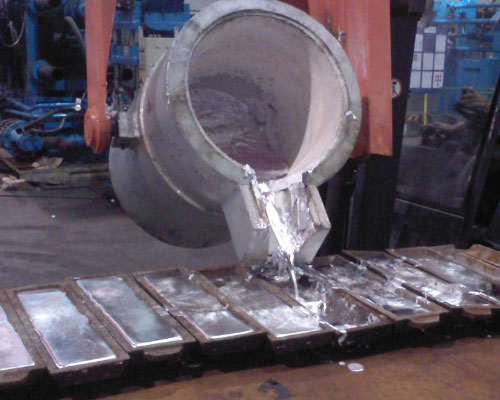Tips for choosing a reliable Aluminum Foundry partner
Wiki Article
The Crucial Uses Aluminum Foundry in Various Industries and Their Impact
Aluminum foundries function as a vital source within various industries. Their resilient and lightweight materials significantly enhance efficiency in auto, aerospace, building and construction, and electronics markets. As each industry leverages aluminum's unique buildings, they likewise add to sustainability efforts. This complex effect motivates a much deeper exploration of exactly how Aluminum shaped these sectors. What certain technologies and advantages occur from its use?Automotive Industry Applications
The vehicle market significantly counts on Aluminum Foundry applications to improve vehicle efficiency and performance. Light weight aluminum's lightweight nature adds significantly to sustain economy, making it a preferred selection for suppliers intending to minimize exhausts and boost total car characteristics. Components such as engine blocks, transmission housings, and wheels are typically created through Aluminum spreading processes, enabling for intricate styles that fulfill rigorous safety and security and efficiency requirements.
Aerospace Innovations

Furthermore, the usage of aerospace-grade Aluminum alloys improves resistance to deterioration and tiredness, necessary for the demanding atmospheres airplane face. Developments in additive manufacturing likewise permit rapid prototyping and customization of elements, lowering preparations and costs.
Building and Facilities
While the construction and framework sectors proceed to progress, Aluminum factories are progressively recognized for their payments to modern-day structure methods. Light weight aluminum's light-weight nature and high stamina make it an excellent product for different structural applications. Factories provide parts such as beams, frames, and facades that boost the toughness and longevity of structures and framework projects.Moreover, light weight aluminum's rust resistance plays a crucial function in expanding the life expectancy of structures subjected to harsh ecological conditions. The energy performance of Aluminum products likewise straightens with sustainable building efforts, adding to lower power intake in construction. Furthermore, cutting-edge casting methods have broadened the layout opportunities, enabling designers and read the article engineers to create cosmetically pleasing yet practical frameworks.
Electronic devices Production
Aluminum foundries play a substantial function in the electronics making industry, where the need for thermally conductive and lightweight materials is extremely important. Metal Castings. Parts such as warm sinks, housings, and braces are usually produced using Aluminum because of its superb thermal residential or commercial properties and ability to dissipate warmth effectively. This is important in digital devices, where getting too hot can result in failing and reduced efficiencyThe versatility of Aluminum permits complex designs and accurate machining, which are important in modern-day electronics. Additionally, light weight aluminum's non-magnetic residential properties make it appropriate for applications in delicate digital equipment, lessening disturbance. Additionally, light weight aluminum's resistance to rust enhances the durability of digital components, guaranteeing long life and reliability.
Sustainability and Reusing Initiatives
Offered the boosting emphasis on environmental obligation, the Aluminum Foundry market has actually made significant strides in sustainability and reusing initiatives. Aluminum is naturally recyclable, permitting shops to recover and reuse product with marginal power expense compared to main manufacturing. This closed-loop recycling procedure not only reduces waste however additionally decreases greenhouse gas exhausts, contributing internet to a more sustainable manufacturing design.In addition, many foundries are embracing energy-efficient innovations, consisting of renewable resource resources, to power their operations (Aluminum Castings). This shift not just lowers dependence on nonrenewable fuel sources yet also improves total operational effectiveness
Industry collaborations are more promoting lasting methods, such as sharing ideal techniques and developing cutting-edge recycling techniques. By prioritizing these initiatives, the Aluminum Foundry sector is placing itself as a leader in sustainable production, straightening with worldwide targets for sustainability while satisfying the demands of numerous industries.

Often Asked Questions
What Are the Main Benefits of Utilizing Aluminum in Foundry Processes?
The primary benefits of using Aluminum in Foundry processes include its light-weight nature, outstanding corrosion resistance, high thermal and electrical conductivity, and flexibility, enabling for intricate styles and reliable recycling, ultimately boosting total production efficiency and reducing expenses. - Aluminum CastingsHow Does Aluminum Foundry Influence Item Lifecycle Management?
Aluminum Foundry greatly improves item lifecycle monitoring by enabling reliable material usage, reducing waste, and assisting in recycling. Its light-weight properties improve transportation effectiveness, while resilience expands product life expectancy, ultimately contributing to sustainability and cost-effectiveness in manufacturing.Are There Particular Difficulties in Aluminum Foundry Production?
Details challenges in Aluminum Foundry production include managing temperature level control, ensuring worldly top quality, lessening waste, and adapting to fluctuating market demands. These elements can affect efficiency, expense, and overall competition within the industry.What Precaution Are Crucial in Aluminum Foundry Operations?
Important safety and security procedures in Aluminum Foundry procedures consist of individual safety devices, proper ventilation, routine tools upkeep, risk interaction, and emergency reaction training. Applying these techniques guarantees employee safety and security and reduces risks connected with high-temperature metal processing.How Does the Cost of Aluminum Contrast to Various Other Metals in Foundry Use?
The expense of Aluminum is usually less than that of metals like copper and titanium, making it a cost-effective choice for lots of Foundry applications. This cost adds to its widespread usage throughout different industries.why not try these out Aluminum factories offer as a vital resource within numerous industries. The automotive market significantly relies on Aluminum Foundry applications to boost automobile efficiency and efficiency. The material's recyclability likewise lines up with the industry's push towards sustainability, as recycled Aluminum calls for substantially less energy to procedure compared to primary light weight aluminum. Aluminum foundries play a substantial duty in the electronics manufacturing sector, where the need for thermally conductive and light-weight products is critical. Offered the increasing focus on ecological duty, the Aluminum Foundry sector has made substantial strides in sustainability and reusing efforts.
Report this wiki page